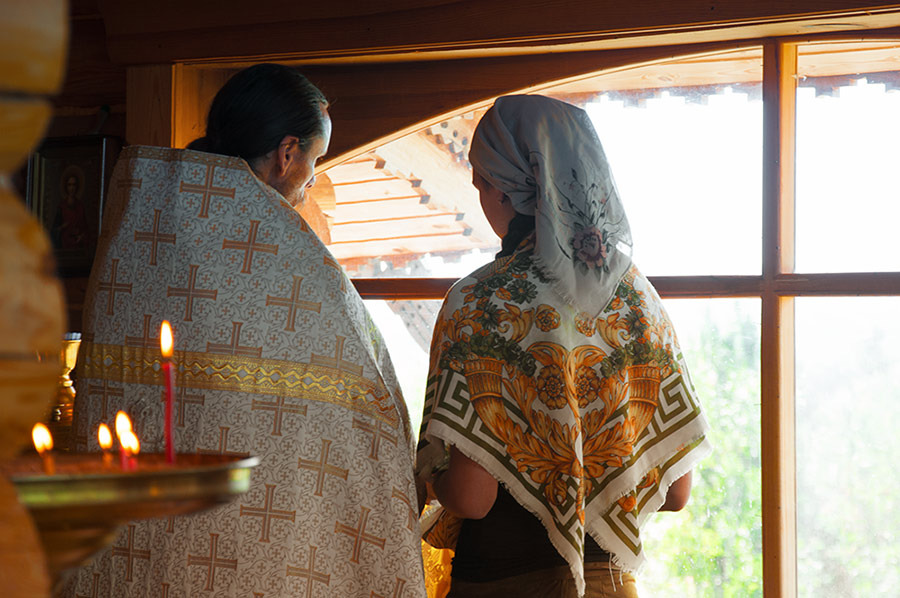When a person realizes the greatness and holiness of the Divine Mysteries, he involuntarily comes across the thought of whether he is ready to accept such grace? Even the holy Apostle Paul, in his epistle to the Corinthians, wrote: “For whoever eats and drinks unworthily, he eats and drinks condemnation to himself, not considering the Body of the Lord. For this reason many of you are weak and sick, and many die ”(11: 29-30).
An unworthy communion is primarily manifested in the absence of humility and fear of God, which are one of the main criteria for a person's readiness for the Eucharist. Accurate adherence to the rules of preparation for the sacrament is not a guarantee of a worthy communion, they are only guidelines. The readiness to receive communion depends on the realization of one's own unworthiness, from which humility is born.
One of the main theses of those who rarely receive communion is that they do not feel worthy, but just through the rare visits to the Chalice, and genuine non-worthiness is manifested.
The main advisor in preparing for the Eucharist is a personal confessor, he is like a physician in the spiritual plane, and he will diagnose and give medicine. Spiritual Father Knows Spiritual

state, and knows what passions torment a person, so he, knowing the commandment of Christ: about the prohibition to lay heavy and unbearable burdens on people (Matt. 23: 4), and determines how a person should prepare for communion. For example, how many days to fast, or what prayer rules to read, etc.
The confessor takes into account the regularity of communion with St. Mysteries, spiritual and moral state, life circumstances. Usually this is a priest, to whom a person comes to confession, while a person can also confess to other clergy, but one must accept spiritual advice in one. Sometimes, if it is useful to a person, the priest imposes a penance on him, through which he is corrected.
Fasting as one of the main conditions for Communion
In the first centuries, in the matter of preparing for the Liturgy, fasting was the "cornerstone" in the matter of retreat. It is necessary to distinguish here that there is a Eucharistic fast, when a person does not eat anything before communion and does not drink at least 6 hours before the Liturgy. Such fasting is obligatory for everyone, except for infants, the sick, and the dying; they must discuss this issue with their confessor.
And in the rules of preparation is spelled out a long fast, when a person refrains from modest food, entertainment, bad habits and from conjugal communication.
Fasting is accompanied by intense prayer, sincere repentance, if there is time, by reading the Holy Scriptures and the Holy Fathers. It is very good on fast days to visit prisoners, sick people in hospitals, help everyone who needs help, etc.
Of course, sick, pregnant women do not observe all the rules of fasting, that is, in food, but they must also force themselves to abstinence.
How many days does he fast? Today it is a practice that if a person regularly approaches the Chalice, he must fast for at least three days, but even here one must have the blessing of a confessor.
A special period in preparation for the Eucharist is the Bright Week, the week after Easter. According to the church charter, it is forbidden to fast this week, therefore, those who fasted in Great Lent may not abstain from modest food on Bright Week. You can do the same with the holidays of Christmas and Epiphany.
Prayer Rule
Naturally, preparation for communion is preceded by prayer, and the Church has established special prayer rules that help a person tune in to the upcoming acceptance of the Holy Mysteries. In almost all prayer books there is a "follow-up to the sacrament", which is the main prayer before the sacrament. These prayer books can be purchased from our
Axios online store. The clergy are our regular customers, and in our catalog of goods, the clergy can choose any goods for the Liturgy, including
eucharistic sets,
patrons, etc. Such goods will be a very good gift for any church. Our utensils are characterized by high wear resistance and the best quality.
You can also read the canons to Christ the Savior, the Most Holy Theotokos, the Guardian Angel and other prayers that the confessor will bless.
The future communicant must come to the evening and morning services, which precede the Liturgy. And between divine services it is imperative to begin the sacrament of Repentance, where a person can cleanse his soul from the burden of sins.
After accepting the Gifts, you need to listen in church or read "thanksgiving prayers", in which Christians offer thanks to God for such ineffable mercy.
Outcome
The Eucharist is the main Sacrament of the Orthodox Church, the Church itself is the Body of Christ, and therefore the Sacrament of the Body and Blood of Christ visibly reveals the mystical nature of the Church, creating a church community.
And the Lord commanded us to partake of His Body and Blood (John 6: 53-54), in order to gain eternal life, and to deify human nature, not by nature, but by grace. But in order to accept such a Shrine, one must constantly prepare oneself for a meeting with Christ. The entire liturgical rhythm is centered on the Eucharist. And we, remembering our unworthiness, must regularly approach the Cup.

 state, and knows what passions torment a person, so he, knowing the commandment of Christ: about the prohibition to lay heavy and unbearable burdens on people (Matt. 23: 4), and determines how a person should prepare for communion. For example, how many days to fast, or what prayer rules to read, etc.
state, and knows what passions torment a person, so he, knowing the commandment of Christ: about the prohibition to lay heavy and unbearable burdens on people (Matt. 23: 4), and determines how a person should prepare for communion. For example, how many days to fast, or what prayer rules to read, etc.



